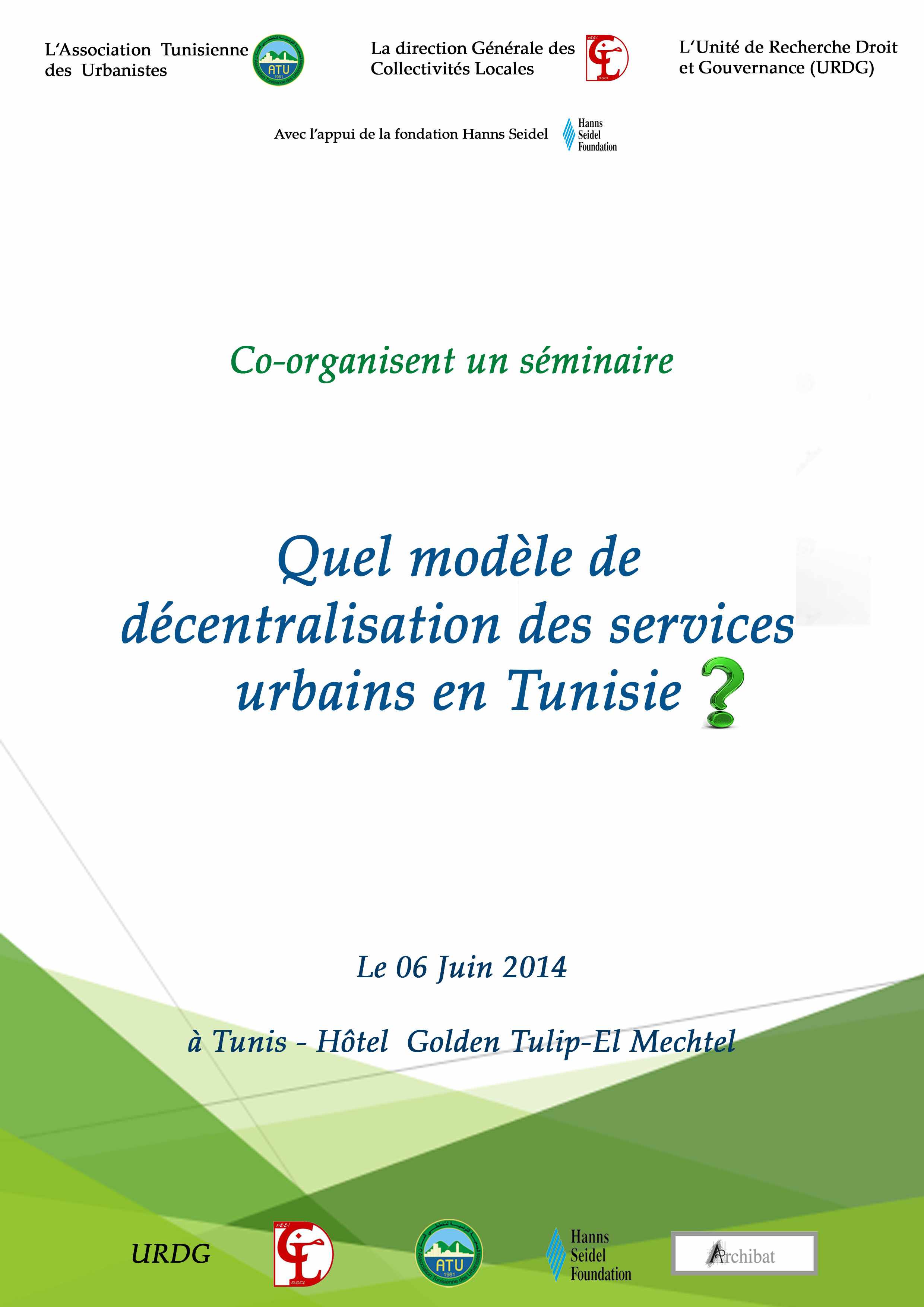Vendredi 6 juin 2014, 8h30-17h30, Hôtel Golden Tulip, El-Mechtel, Tunis
Conférence organisée par l’Association Tunisienne des Urbanistes, la Direction Générale des Collectivités Locales (ministère de l’Intérieur) et l’Unité de Recherche Droit et Gouvernance.
La question territoriale a été au cœur de la révolution tunisienne. Les déséquilibres régionaux et les difficultés d’accès à l’emploi et aux services ont dès lors fait partie des thèmes les plus médiatisés sur la scène politique de l’après 14 janvier 2011. La décentralisation a rapidement figuré comme un principe phare des réformes, d’abord dans les programmes des principaux partis en course vers la constituante (ANC) et ensuite dans les orientations dégagées des travaux de l’ANC. L’approbation de la constitution de janvier 2014, et notamment son chapitre sept sur le Pouvoir Local constitue le couronnement du consensus sur la décentralisation.
Aujourd’hui, la Tunisie a atteint un second palier dans sa course à l’instauration d’un système décentralisé avec l’affirmation des principes de décentralisation, de subsidiarité, de libre administration des collectivités et de participation citoyenne aux affaires locales. Et en même temps, un chantier est ouvert, celui de la préparation de l’opérationalisation de la réforme.
Dans cette perspective, et dans l’attente de la mise en place de structures chargées de mener les débats et les travaux sur les orientations des réformes de décentralisation, l’Association Tunisienne des Urbanistes en partenariat avec la Direction Générale des Collectivités Locales, et l’unité de recherche Droit et Gouvernance et avec l’appui de la Fondation Hanns Seidel, organise un séminaire de réflexion sur les enjeux liés à la décentralisation des services urbains. L’objectif principal étant de rassembler chercheurs, experts et parties prenantes dans des discussions sur les thématiques clés de la réforme, afin de délimiter les contours des grandes questions à traiter. Le sujet principal qui sera débattu dans ce séminaire concerne les modèles possibles d’organisation des services urbains conformément aux nouveaux principes constitutionnels, en partant de l’organisation actuelle de ces services, ainsi que les problématiques que ces modèles suscitent.
PROGRAMME
8h30 Réception des participants
8h50 Allocution d’ouverture
- Mokhtar Hammami, DGCL
- Yassine Turki, ATU
- Mustapha Ben Letaif, URDG
9h10 Exposé introductif
Villes, transition et services urbains, par Yassine Turki, ATU
9h20 Séance : Panorama mondial et arabe de l’organisation des services urbains
- Aude Signoles, IREMAM-France: Etat de la décentralisation dans les pays arabes
- Eric Verdeil, Univ. Lyon: Eau, gaz et électricité: entre gestion sectorielle centralisée et enjeux locaux
- Aziz Iraki, INAU-Maroc: Organisation des services urbains au Maroc
Débat
10h20 Pause Café
10h40 Séance 2: Organisation actuelle des services urbains en Tunisie: problématiques et limites
Fathi Neifer, ATU: Services urbains et décentralisation en Tunisie
Débat
11h30 Séance 3: Principes constitutionnels et démarches d’opérationnalisation de la décentralisation
- Mokhtar Hammami, DGCL: Réforme de décentralisation en Tunisie: des principes à l’opérationnalisation
- Mustapha Ben Letaif, URDG: Enjeux de la réforme de décentralisation des services urbains
- Makram Montasser, ISG-ATU: Quelle organisation territoriale des services urbains?
Débat
12h30 Déjeuner
14h00 Séance 4: Ateliers parallèles sur les enjeux de la réforme
Atelier 1: Organisation des réseaux eaux et énergie
Animation: Eric Verdeil, Univ. Lyon ; Rapporteur: Rafika Adhadhi
Atelier 2: Quels services urbains innovants et quel partenariat public-privé?
Animation: Henda Gafsi, CILG-VNGi ; Rapporteur: Wafa Khaled
Atelier 3: Organisation des transports urbains
Animation: Rafaa Mraihi, Univ. Manouba ; Rapporteur: Souhir Bouzid
15h20 Pause Café
15h40 Séance 5: Restitution des workshops et recommandations sur les objectifs et les approches de réforme
